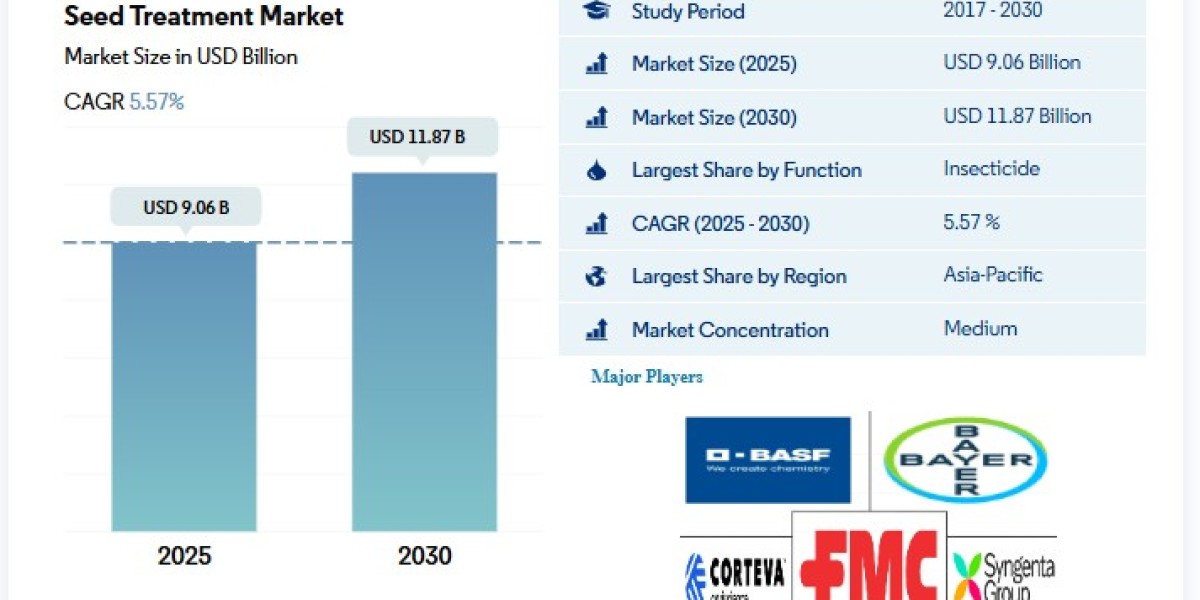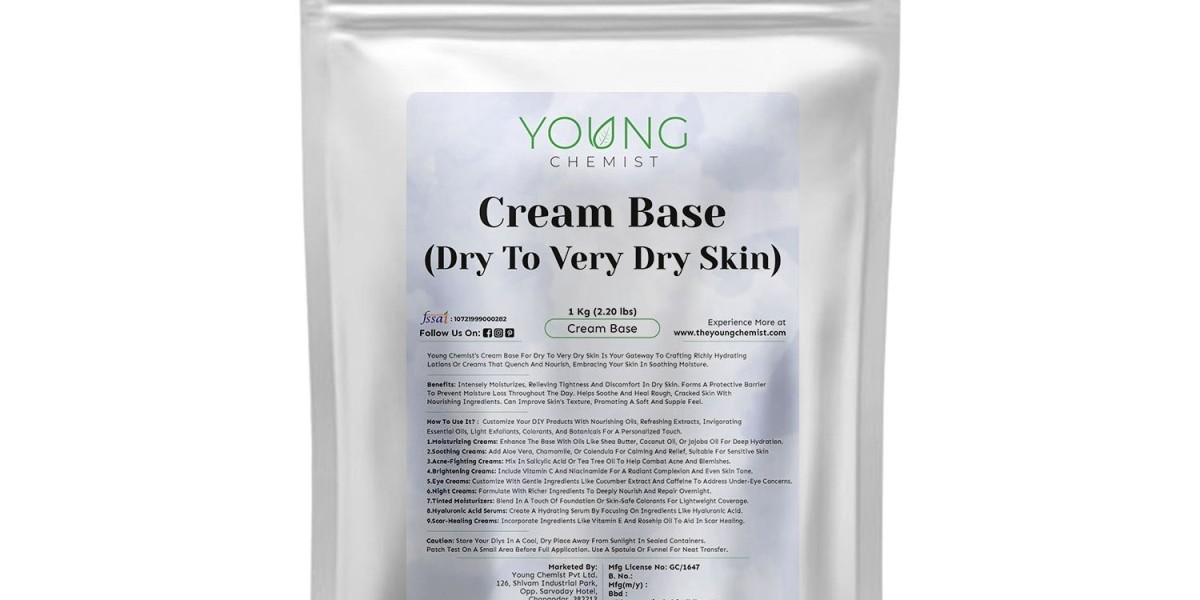The seed treatment market is expected to grow from USD 9.06 billion in 2025 to USD 11.87 billion in 2030 at a CAGR of 5.57%. Insecticides hold the largest share by function, with Asia-Pacific leading by region. Key players include BASF, Bayer, FMC, Corteva, and Syngenta. The global seed treatment market is experiencing robust growth as farmers and agricultural businesses increasingly adopt sustainable practices to maximize crop yields and protect seeds from pests and diseases. Seed treatment, which involves the application of chemical, biological, or physical agents to seeds, enhances seed quality and ensures healthy crop production. As the world faces challenges such as climate change, soil degradation, and increasing food demand, seed treatment has emerged as a crucial component of modern agricultural practices.
According to industry reports, the seed treatment market is poised for substantial growth due to rising demand for sustainable agriculture, advancements in crop protection technologies, and increasing awareness of the benefits of treated seeds. The market’s growth trajectory is further supported by innovations in biological seed treatment solutions and partnerships aimed at reducing the environmental impact of traditional chemical treatments.
Key Industry Development:
In January 2023, Bayer AG announced a strategic partnership with Oerth Bio to advance crop protection technologies and create eco-friendly solutions. This collaboration highlights the growing emphasis on sustainability and innovation in the agricultural sector, significantly impacting the seed treatment market.
Top Companies in the Seed Treatment Market
- BASF SE
- Bayer AG
- Corteva Agriscience
- FMC Corporation
- Syngenta Group
Market Drivers & Restraints
Market Drivers:
Rising Focus on Sustainable Agriculture: Governments, organizations, and consumers are increasingly emphasizing the importance of sustainable farming practices. Seed treatment offers an environmentally friendly alternative to traditional chemical-based crop protection methods, reducing the need for excessive pesticide application.
Growing Need to Enhance Crop Yield: With global food demand rising, farmers are adopting advanced seed treatment techniques to improve seed quality and ensure higher crop yields. Treated seeds are better equipped to resist pests, diseases, and adverse environmental conditions.
Technological Advancements in Biological Seed Treatments: The development of biological seed treatment solutions, including microbial and plant-derived treatments, is gaining traction. These eco-friendly alternatives not only protect seeds but also enhance soil health and biodiversity.
Market Restraints:
High Costs Associated with Seed Treatment: The initial investment required for advanced seed treatment solutions can be a barrier for small-scale farmers, limiting market growth in certain regions.
Stringent Regulatory Frameworks: Strict regulations governing the use of chemical seed treatments and their environmental impact pose challenges for manufacturers and slow down product approvals.
Market Segments
The seed treatment market is segmented into the following categories:
By Function:
- Fungicide: Widely used to prevent fungal infections that can damage seeds and crops.
- Insecticide: Protects seeds from insect attacks, ensuring better germination and growth.
- Nematicide: Targets nematodes, which can cause significant crop losses.
By Crop Type:
- Commercial Crops: Includes cotton, sugarcane, and other high-value crops that require effective protection.
- Fruits & Vegetables: A growing segment driven by the demand for high-quality, pest-free produce.
- Grains & Cereals: The largest segment, as these crops form the staple diet for a significant portion of the global population.
- Pulses & Oilseeds: Witnessing growth due to the increasing demand for protein-rich crops and biofuels.
- Turf & Ornamental: A niche segment catering to landscaping and ornamental plant cultivation.
By Region:
- North America: Dominates the market due to advanced agricultural practices and strong adoption of seed treatment technologies.
- Europe: Growth supported by strict regulations promoting sustainable and eco-friendly farming methods.
- Asia-Pacific: The fastest-growing region, driven by rising food demand, population growth, and increasing awareness of seed treatment benefits.
- Rest of the World: Includes Latin America, the Middle East, and Africa, where the market is gradually expanding due to improved agricultural infrastructure.
Market Competitive Landscape
The seed treatment market is highly competitive, with key players focusing on research and development, strategic partnerships, and product diversification to strengthen their market positions. Collaborations, such as Bayer AG’s partnership with Oerth Bio, underline the importance of innovation in addressing environmental concerns and enhancing crop protection solutions. Companies are also investing in bio-based treatments to meet the growing demand for sustainable and eco-friendly products.
Future Market Scope
The seed treatment market is set to witness significant advancements in the coming years as technological innovations and sustainability initiatives reshape the agricultural landscape. Key trends expected to drive future growth include the increased adoption of biological seed treatments, integration of precision agriculture technologies, and the development of tailored solutions for specific crops and regions.
Additionally, rising consumer awareness of sustainable food production and stricter regulations on chemical inputs will push manufacturers to invest in eco-friendly alternatives. Strategic alliances and collaborations among leading companies will further accelerate market growth and innovation.
Conclusion
The global seed treatment market is at the forefront of transforming agriculture through innovative and sustainable solutions. As the industry addresses challenges such as climate change, soil health, and food security, seed treatment technologies offer a pathway to more resilient and productive farming systems. By investing in advanced treatments and forming strategic partnerships, companies are not only meeting the needs of farmers but also contributing to a more sustainable future.
For a comprehensive understanding of the trends shaping the future of the Seed Treatment Market, access the full report here. Stay ahead of the curve by leveraging our insights to drive your strategic decisions.
About Mordor Intelligence
Mordor Intelligence is a trusted partner for businesses seeking comprehensive and actionable market intelligence. Our global reach, expert team, and tailored solutions empower organizations and individuals to make informed decisions, navigate complex markets, and achieve their strategic goals. With a team of over 550 domain experts and on-ground specialists spanning 150+ countries, Mordor Intelligence possesses a unique understanding of the global business landscape. This expertise translates into comprehensive syndicated and custom research reports covering a wide spectrum of industries, including aerospace & defence, agriculture, animal nutrition and wellness, automation, automotive, chemicals & materials, consumer goods & services, electronics, energy & power, financial services, food & beverages, healthcare, hospitality & tourism, information & communications technology, investment opportunities, and logistics.
For any inquiries or to access the full report, please contact: media@mordorintelligence.com
https://www.mordorintelligence.com/
Naijamatta is a social networking site,
download Naijamatta from Google play store or visit www.naijamatta.com to register. You can post, comment, do voice and video call, join and open group, go live etc. Join Naijamatta family, the Green app.
Click To Download

